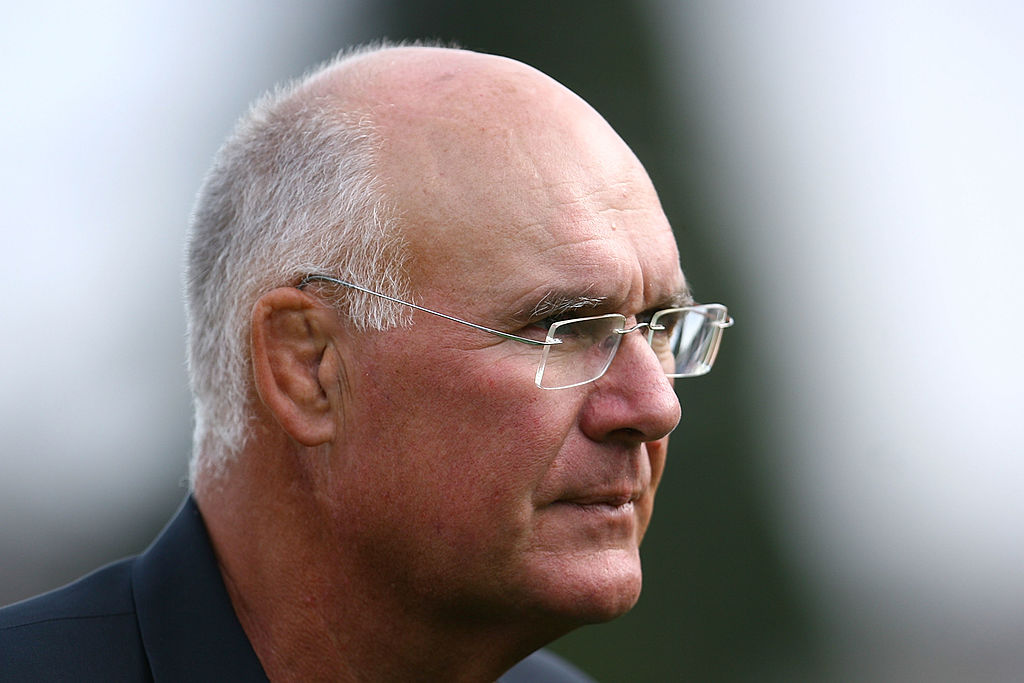For Andy Haden a winning end always justified the means

QUEENSTOWN, NEW ZEALAND - SEPTEMBER 18: Former All Black Andy Haden looks on during a friendly match between the classic All Blacks of New Zealand and the French Classics of France at Queenstown Recreation Ground on September 18, 2011 in Queenstown, New Zealand. (Photo by Teaukura Moetaua/Getty Images)
Andy Haden would be faintly amused to learn that he has now headed the list of rugby outlaws wanted in Wales for more than 40 years, a sort of latter-day Jesse James.
Many of the 50,000 at Cardiff Arms Park on Armistice Day 1978 claim to have witnessed a heist on a grander scale than any pulled off by the baddest man of the Wild West before he was shot in the back by one of his own gang, ‘the dirty little coward, Robert Ford’.
James merely robbed banks and stagecoaches. Haden, the legend goes, did something far worse. He robbed an entire nation, his premeditated action in the final minutes ensuring that, by hook or, more pointedly, by crook, the All Blacks cheated Wales out of a rare victory.
From that day to this, the New Zealander has never shown the faintest trace of remorse for his outrageous impression of Greg Louganis in diving out of the last lineout which gave substitute full back Brian McKechnie the penalty to steal the match 13-12.
The referee, the late Roger Quittenton, swore to his dying day that he gave the kick because Geoff Wheel had barged Frank Oliver, not because of the faked attempt by Oliver’s partner in crime to pretend he had fallen victim to the same offence. The Welsh hooker Bobby Windsor summed up the team’s view: “Ref, you’ve been conned.”
Haden was never one to waste any time on abstract ideals like the spirit of the game or the meaning of Corinthianism. What drove him, more ruthlessly perhaps than any other like-minded rugby player, was an utter detestation for losing.
In Haden’s book, a winning end will justify the means, no matter how obnoxious.
“Every time we travelled across the Severn Bridge into Wales, a funny little ritual would take place at the back of the bus,” he told me some years ago. “We’d tell ourselves: ‘Don’t be the next ones to lose here’.
“We used to recite that. Whenever I left the shed (dressing-room) my attitude was always the same: don’t finish up asking: ‘What more could I have done?’
“I remember going back to the hotel after the Welsh match and the telephone girl rushed up saying: ‘Mr Haden, I’ve got 20 international calls waiting and they’re all for you.’
“I could see the switchboard all lit up. I pulled out every plug and told her: ‘Don’t worry. They’re going to be asking the same questions in 50 years’ time’.”
And so they will, except the man himself will no longer be around by then to hear them. At 69, Andy Haden was in a ‘grave’ condition fighting the one fight he knows he cannot win before sadly passing away on Wednesday, against the cancer which was first diagnosed 17 years ago.
Like everything else in his life, he has given it a serious run for its money. There was much to admire about Haden, not least his seven Test wins in successive series against the Lions but also how he had the nerve and the conviction to see through the absurdity of the amateur regulations before almost anyone else.
Before heading for the UK on that fateful tour in 1978, the All Blacks filled in a biographical questionnaire. When it came to ‘occupation’, only Haden had the audacity to write ‘Rugby Player’.